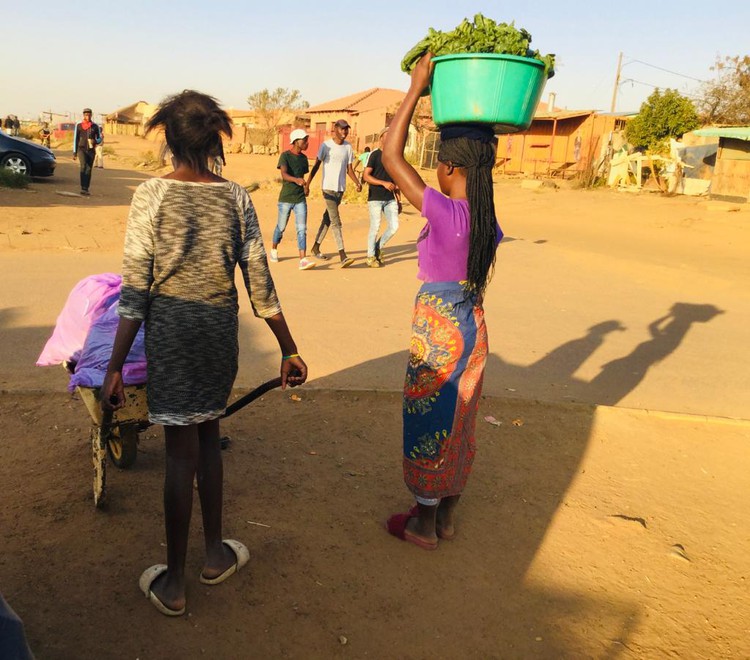
17 June 2020
Clara and her sister Sandra have been going door-to-door with their wheelbarrow of fruit and vegetables to sell in an informal settlement in Langaville near Tsakane to help their mother make ends meet. Photo: Kimberly Mutandiro
“Our mother has taught us to work extra hard because we are immigrants who do not receive grant money, and not to compare ourselves with rich families because we cannot all be the same,” says grade 8 learner Clara*.
She is from Mozambique but came to extension 6 informal settlement in Langaville near Tsakane, Ekurhuleni, when she was a baby.
Clara and other teenage girls from the township go door-to-door with wheelbarrows, selling fruit and vegetables to help sustain their families during the Covid-19 lockdown.
Their parents mostly rely on informal trading and piecemeal work to make ends meet, but the lockdown has made surviving more difficult.
Clara is 16 and her sister, Sandra, is 14. They usually start at 7am and push their wheelbarrows up to five kilometres to visit different sections of the informal settlement.
When we met the sisters, it was 6pm and they had just returned from their rounds. Their wheelbarrow still had a few vegetables in it as well as plastic bags filled with secondhand clothing donated by neighbours.
Their mother sells vegetables at a nearby street corner and packs out some produce for them every morning to increase the family’s chances of making a sale. Their father has a small business in KwaZulu-Natal and has not been to travel home since the start of the lockdown.
“We volunteered to help our mother sell vegetables because we have been struggling at home,” says Sandra.
She says when the lockdown started, their mother could not work for a month. This is when they started their venture and quickly realised that the customers were supporting them. On a good day, they make up to R170, but these days are far and few between.
“While going around people feel sorry for us. They ask why we cannot stay at home? And we tell them that if we do not help our mother, she will not have money to buy us food,” says Sandra.
“We do not know when we last ate bread or had real meat. Our mother has been [saving money] to help buy us warm clothes for the winter,” she said.
The sisters explained that not long after they started their venture, a few other girls from their community began offering the same service.
Matilda is 12 and operates a small stall selling packets of chicken, sausages, fish and some scones baked by her aunt. We met Matilda on a cold evening. She was standing at her stall, barefoot and wearing a sleeveless vest.
She explained that she also packs some of her merchandise into a small basket and walks around and returns to her stall when she gets tired. Matilda is an orphan and was brought to South Africa from Maputo to live with her aunt.
Her aunt struggles to make ends meet and Matilda has to help to bring in more money. Her aunt’s two children are still too young to help.
“We are never short of food to eat … but she [my aunt] does not have money to buy me clothes.”
At nightfall we watched as Matilda packed away her stock and moved the table inside their yard. She will bath and go to bed early because tomorrow will be another long day.
Matilda says that more than anything, she cannot wait for classes for her school grade to resume.
* All names have been changed